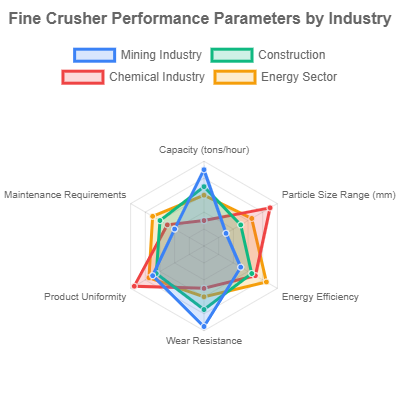Industry Adaptation Guide: How to Select the Appropriate Fine Crusher for Different Industries

This comprehensive guide explores the strategic selection of fine crushers across various industrial sectors, providing essential insights into matching crushing equipment with specific operational requirements. Fine crushers serve as crucial components in material processing operations, transforming raw materials into precisely sized particles for diverse applications. Understanding the unique demands of different industries enables optimal equipment selection that balances performance, efficiency, and cost-effectiveness. This examination covers fundamental principles, industry-specific considerations, and practical implementation strategies for maximizing fine crusher performance in various operational contexts.
Understanding Fine Crusher Fundamentals and Varieties
Fine crushers represent specialized equipment designed for reducing material size to specific granular specifications, typically ranging from 5 to 50 millimeters. These machines employ various crushing mechanisms, including compression, impact, and shear forces, to achieve desired particle size distributions. The core functionality revolves around transforming larger feedstock into consistent, usable aggregates that meet industry standards for subsequent processing or direct application.
Different fine crusher types exhibit distinct operational characteristics and performance capabilities. Cone crushers utilize gyrating mantles within concave crushing chambers to compress materials between mechanical surfaces. Impact crushers accelerate materials against stationary surfaces using high-speed rotors, achieving fracture through kinetic energy transfer. Each design offers unique advantages in terms of product shape, production capacity, and energy efficiency, making proper selection critical for operational success.
Mining Industry Requirements for Fine Crushing Equipment
The mining sector presents particularly demanding conditions for fine crushing operations, requiring robust equipment capable of processing abrasive and hard materials consistently. Mining applications typically involve reducing extracted ores to specific sizes for further processing or direct shipment. Equipment must withstand continuous operation while maintaining precise control over product size distribution, as downstream processes often depend on consistent feed characteristics.
Durability considerations become paramount in mining environments, where equipment faces extreme wear from abrasive materials. Crusher components require specialized metallurgy and design features to extend service life between maintenance intervals. Production volumes in mining operations often reach several thousand tons per hour, necessitating equipment with substantial capacity and reliability. The selection process must balance initial investment against operational costs, including maintenance, energy consumption, and replacement part requirements.
Construction Industry Fine Crusher Selection Criteria
Construction material processing demands fine crushers capable of handling diverse feed materials while producing consistent aggregate specifications. The industry requires equipment that can process natural stone, recycled concrete, and various demolition materials into precisely graded products for structural applications. Product shape characteristics significantly influence the final concrete or asphalt properties, making crusher selection a critical factor in end-product quality.
Modern construction projects increasingly incorporate recycled materials, creating additional complexity for crushing operations. Equipment must accommodate variable feed materials while maintaining output consistency. Environmental considerations now play a significant role in equipment selection, with noise reduction, dust suppression, and energy efficiency becoming important decision factors. Mobile crushing solutions have gained prominence for their ability to process materials directly at construction sites, reducing transportation requirements and associated costs.
Chemical Industry Specialized Crushing Requirements
Chemical processing applications introduce unique material characteristics that influence fine crusher selection and operation. Many chemical raw materials exhibit specific properties such as hygroscopic behavior, thermal sensitivity, or particular flow characteristics that require specialized equipment features. Crushers must maintain product purity by preventing contamination from wear parts or lubricants, necessitating particular material selections and design considerations.
Corrosion resistance becomes a critical factor when processing chemically active materials, influencing material selections for crusher components. Equipment must often incorporate specialized seals and protection systems to prevent product contamination or environmental releases. Precision in particle size distribution takes on added importance in chemical applications, where product performance often directly relates to specific surface area and particle morphology.
Energy Sector Crushing Applications and Demands
Energy production facilities utilize fine crushers for preparing various fuel sources and process materials, each presenting distinct operational challenges. Coal processing requires equipment capable of handling relatively soft but abrasive materials while producing consistent sizing for combustion efficiency. Equipment selection must consider the specific characteristics of different coal ranks, from relatively soft lignite to harder anthracite varieties.
Biomass processing introduces additional considerations, as plant-based materials often exhibit fibrous characteristics that challenge conventional crushing approaches. Equipment must prevent material wrapping around rotating components while achieving desired particle size reduction. Modern energy sector applications increasingly prioritize energy efficiency in crushing operations, as the energy consumed in size reduction represents a significant portion of overall process energy requirements.
Cross-Industry Selection Considerations and Strategies
Despite industry-specific requirements, common themes emerge in fine crusher selection across different sectors. Equipment reliability and maintenance requirements consistently influence operational costs and production availability. Modern crushers increasingly incorporate automation and monitoring systems that optimize performance while reducing operational intervention. These systems can adjust operational parameters in real-time based on feed material characteristics and production requirements.

Lifecycle cost analysis provides a comprehensive framework for evaluating crusher options across different industries. This approach considers not only initial acquisition costs but also operational expenses, maintenance requirements, and expected equipment lifespan. Technological advancements continue to improve crusher efficiency and capabilities, with developments in wear materials, drive systems, and control technologies offering enhanced performance across diverse applications.